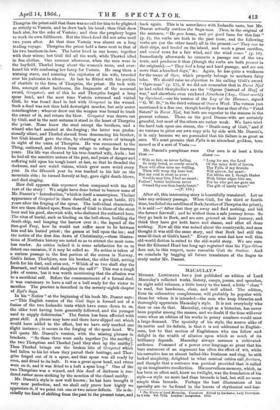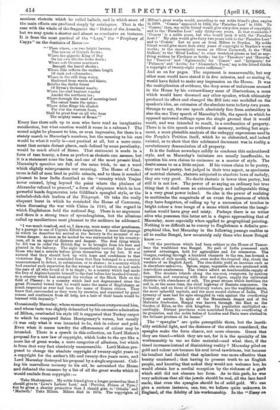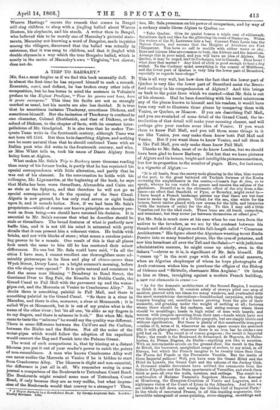MACAULAY.*
MESSRS. LONGMANS have just published an edition of Lord Macaulay's collected works, history, essays, poems, and speeches, in eight solid volumes, a little heavy to the hand, a little " close " to read, but handsome, clear, and well edited. The edition, from its exhaustive completeness, will probably be popular with those for whom it is intended—the men who keep libraries and thoroughly appreciate Macaulay's style. It is not everybody who. does or can do that. Macaulay, except as a historian, has never been popular among the masses, and we doubt if the time will ever come when an edition of his works in penny numbers would meet• a large demand. The specialty of his style, the source alike of its merits and its defects, is that it is not addressed to English-,, men, but to that section of Englishmen who can follow and delight in the wealth of allusion upon which so much of its. brilliancy depends. Macaulay always assumes a cultivated audience. Possessed of a power over language so great that his. bare statement of an argument has often the effect of wit, while his narrative has an almost ballad-like freshness and ring,. he still lacked simplicity, delighted in what musical critics call foriture, and thought that a sentence was poetical provided that it called up an imaginative recollection. His marvellous memory, which, as has been so often said, knew no twilight, was the foundation of his style—a style no more bad than brocade is bad, but still no more simple than brocade. Perhaps the best illustrations of his specialty are to be found in the bursts of rhythmical and has- 'The Works of Lord Macaulay. Complete. Edited by his Sister, Lady Trevelyan. In 8 yob. Vol. VIII. London: Longman'. 1555. monious rhetoric which he called ballads, and in which some of the main effects are produced simply by catalogues. That is the case with the whole of the fragment the " Defeat of the Armada," but we may quote a shorter and almost as conclusive an instance. It is from the meet poetical of the "Lays," the "Prophecy of Capys" on the destinies of BLOM :— "'Then where, o er two bright havens,
The towers of Corinth frown ; Where the gigantic Ring of Day On his own -Rhodes looks down; Where soft Orontes murmurs Beneath the laurel shades ; Where Nile reflects the endless length Of dark red colonnades ; Where in the still deep water, Sheltered from waves and blasts, Bristles the dusky forest Of Byrsa's thousand masts; Where fur-clad hunters wander Amidst the northern ice ; Where-through the sand of morning-land The camel bears the spice; Where Atlas flings his shadow Far o'er the western foam, Shall be great fear on all who hear The mighty name of Rome.' "
Every line there calls up to men who have read an imaginative recollection, but what emotion would it rouse in a cabman The sound might be pleasant to him, or even impressive, for there is a stately march in Macaulay's numbers, but the meaning to his ears would be what it really is—not poetical at all, but a mere state- ment that certain distant places, each defined by some peculiarity, would be much afraid of Rome. That statement is made in a form of rare beauty, a form as perfect as rhetoric can assume, but it is a statement none the lees, and-one of the most prosaic kind. Macaulay's speeches are full of the same trick, to use a word which slightly misrepresents our meaning. The House of Com- mons is full of men bred in public schools, and to them it sounded pleasant to hear India described as the "country which Trajan never entered, lying beyond the point where the phalanx of Alexander refused to proceed," a form of eloquence which in less powerful hands degenerates into Gilfillan's spangled style, or the rubadub-dub-dub leaders of the Telegraph. Or take the really 'eloquent burst in which he reminded the House of Commons, when discussing the war with China in 1840, of the regard in which Englishmen held the national flag. There is no argument and there is a strong trace of spreadeagleism, but the allusions called up recollections most pleasant to the audience he addressed.
"I was much teneheel, and so, I dareeay, were many other gentlemen, by a passage mono of Captain Billet's despatches. I mean that passage in which he describes his arrival at the factory in the moment of ex- treme danger. As soon as he landed he was surrounded by his country- men, all in an agony of distress and despair. The first thing which he did was to order the British Sag to be brought from his boat and planted in the balcony. The sight immediately revived the hearts of those who had a minute before given themselves up for lost. It was natural that they should look up with hope and confidence to that victorious flag. For it reminded them that they belonged to a country unaccustomed to defeat, to submission, or to shame ; to a country which had exacted such reparation for the wrongs of her children as had made the ears of all who heard of it to tingle ; to a country which had made the Dey of Algiers humble himself to the dust before her insulted Consul ; to a country which had avenged the victims of the Black Hole on the field of Plessey; to a country which had not degenerated since the great Protector vowed that he would make the name of Englishman as much respected as ever had been the name of Roman citizen. They knew that, slut-minded as they were by enemies, and separated by great -oceans and continents from all help, not a hair of their heads would be harmed with impunity."
Occasionally Macaulay, whose-memorysometimes overpowered him, .and whose taste was slightly debauched by his excessive admiration of Milton, overloaded his style till it suggested that Turkey carpet to which he compared Satan Montgomery's verses, but usually At was only what it was intended to be, rich in colour and gold. Even when it seems tawdry the efflorescence of colour may be intended. There is a speech in this collection, on Lord Mahon's proposal for a new law of copyright, which looks to the eye like a mere list of great works, a mere congeries of allusions, but which is from that very fact absolutely unanswerable. Lord Mahon pro- posed to change the absolute copyright of twenty-eight years to .a copyright for the author's life and twenty-five years more, and Lord Macaulay destroyed his proposal by a single argument. Call- ing his marvellous memory to his aid, he astonished the House
and defeated the measure by a list of all the great works which it would exclude from copyright:— 'Take Shakespeare. My noble friend gives a longer protection than I should give to 'Love's Labour Lost,' and Pericles, Prince of Pyre;' but he gives a shorter protection than I should gigs to 'Othello' and Macbeth.' Take Milton. Milton died in 1674. The copyrights of
Mflton's great works would, according to my noble friend's plan, expire in 1699. Comas ' appeared in 1634, the 'Paradise Lost' in 1668. To 'Coruna,' then, my noble friend would give sixty-five years of copyright. and to the Paradise Lost' only thirty-one years. Is that reasonable ? °emus ' is a noble poem, but who would rank it with the Paradise Lost ? ' My plan would give forty-two years both to the 'Paradise Lost' and to Comns.' Let us pass on from Milton to Dryden. My noble friend would give more than sixty years of copyright to Dryden's worst works; to the encomiastic verses on Oliver Cromwell, to the 'Wild Gallant,' to the 'Rival Ladies,' to other wretched pieces as bad as any- -thing written by Flecknoe or Settle : but for 'Theodore' and 'Honoree,' for Tattered ' and Sigismunda,' for 'Cimon ' and Iphigenia,' for Palamon' and 'Arcite,' for Alexander's Feast,' ray noble friend thinks a copyright of twenty-eight years sufficient"
And so on for pages. The argument is unanswerable, but any other man would have stated it in five minutes, and so stating it, -would have failed to make any impression on the House. It was the multiplication of evidence, the deep sense of unfairness aroused in the House by his extraordinary mass of illustrations, a mass which would have drowned any other speaker, which ultimately produced its effect and changed the Bill into one modelled on the
speaker's idea, an extension of the absolute term to forty-two years. Strange to say, the one speech absolutely free from embroidery is also the one Tory speech of Macaulay's life, the speech in which he opposed universal suffrage upon the single ground that it would result, and was intended to result, in a confiscation of property. There is in this speech no evidence of memory, nothing but argu- ment, a most plausible analysis of the unhappy expressions usedin the People's Petition itself, which he so elaborated, and indeed twisted, as to show that this celebrated document was in reality a revolutionary denunciation of all property.
It is the fashion nowadays mildly to condemn this embroidered style, and as Macaulay's imitators are usually insufferable, to question his own claims to eminence as a master of style. The doubt seems to us a little unjust. If his verses claim to be poetry, they are bad poetry, but judged in their true aspect, as specimens of metrical rhetoric, rhetoric subjected to absolute laws of melody, they are very good. No doubt rhetoric is lower than poetry, but still it is not low. The power of so saying an ordinary but true thing that it shall seem an extraordinary; and indisputable thing is a very great power indeed. So also is the power of realizing to multitudes the magnitude of an event the greatness of which they have forgotten, of calling up by a succession of touches in bright colour a true image of a scene which otherwise the imagi- nation would leave grey and misty. Perhaps there is no writer alive who possesses this latter art in a degree approaching that of Macaulay, more especially when applied to geographical painting. Nothing is so difficult as to convey to Englishmen a definite geo- graphical idea, but Macaulay in the following passage enables us all to realize Bengal, how accurately only those who know Bengal know :—
" Of the provinces which had been subject to the House of Tamer- lane the wealthiest was Bengal. No part of India possessed such natural advantages, both for agriculture and for commerce. The Ganges rushing through a hundred channels to the sea, has formed a vast plain of rich mould, which, even under the tropical sky, rivals the verdure of an English April. The rice-fields yield an increase such as is elsewhere unknown. Spices, sugar, vegetable oils are produced with marvellous exuberance. The rivers afferd an ineahaustible.supply of fish. The desolate islands along the sea-cost, overgrown by noxious vegetation, and swarming with deer and tigers, supply the cultivated districts with abundance of salt. The great stream which fertilizes the soil is at the same time, the chief highway of Eastern commerce. On its banks, and on those of its tributary waters, are the wealthiest marts, the most splendid capitals, and the most sacred shrines of India. The tyranny of man had for ages struggled in vain against the overflowing bounty of nature. In spite of the Mussulman despot and of the Mahratta freebooter, Bengal was known through the East as the Garden of Eden, as the rich kingdom. Its population multiplied ex- ceedingly. Distant provinces were nourished from the overflowing of its granaries, and the noble ladies of London and Feria were clothed-in the delie,ate produce of its looms."
The " spangles " are quite perceptible there, but the inevit- ably artificial light, and the distance of the sitters considered, the spangles make the form clearer, not more obscure. Grant that they are tinsel—which they are not, for it is the specialty of his workmanship to use no false material—and what then, if the tinsel increases instead of diminishing reality ? Macaulay piled on gold and colour not because his soul loved tawdriness, but because his intellect had decided that splendour was more effective than beauty unadorned ; that having to present truth to an English people, and knowing that naked they would not welcome her, he would obtain her a cordial reception by the richness of a garb which still did not obscure her form. As to this garb, he was very solicitous that all the jewels should be real, all the lace hand made, that even the spangles should be of solid gold. We can give a curious instance, one, too, we believe quite unknown in England, of the fidelity of his workmanship. In the "Essay on
Warren Harding" oecurs the remark that nurses in Bengal still sing children to sleep with a jingling ballad about Warren Hostem, his elephants, and his steeds. A writer then in Bengal, who believed this- to be merely one of-Macaulay's pictorial state- ments, Macaulay not knowing a word of Bengalee, made inquiries -among the villagers, discovered that the ballad was actually in -existence, that it was sung to children, and that it jingled with double rhymes in a way which the true Bengalee ballad, which is nearly in the metre of Macaulay's-own " Virginias," but slower, does not do.
































 Previous page
Previous page